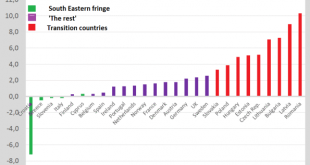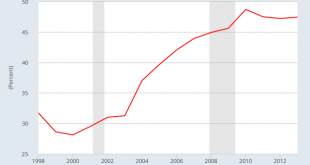from Peter Radford My wife is reading Kahneman’s “Thinking Fast and Slow”, somewhere in which he relates his reaction when he first came across the bedrock of mainstream economics: rational microeconomic behavior. I must admit I had a very similar reaction. The description of human behavior that underpins modern economics is so bizarre that my first thought was that it must be some form of Monty Pythonesque satire. Surely, I thought, this is a joke and in a few pages all will be revealed....
Read More »The Laws of Free Trade are not Immutable After All
For years, we’ve been told the dictates of globalization, and the intrusive and prescriptive terms of free trade agreements in particular, are immutable, natural, and unquestionable. When workers were displaced by the migration of multinational capital toward more profitable jurisdictions, we were told there’s nothing we can do about it except join the race to the bottom in a desperate attempt to hang onto our jobs. When investment and employment were undermined by lopsided trade and...
Read More »Dean Baker: A Public Option is the Solution to the Un Affordable Care Premium Jumps
Originally Published on TRNN on Oct 27, 2016 Dean Baker of CEPR says if people could buy into a public option, it could seriously mitigate the price hikes Dean Baker BIO: Dean Baker co-founded CEPR (Center for Economic and Policy Research) in 1999. His areas of research include housing and macroeconomics, intellectual property, Social Security, Medicare and European labor markets. He is the author of several books, including Rigged: How Globalization and the Rules of the Modern Economy...
Read More »More evidence of early US involvement in Indian demonetisation
from Norbert Haering When Prime minister Narendra Modi took the bulk of Indian cash out of circulation, he caused great hardship for many Indians, while a disruption-loving tech elite and political establishment asked for optimism and patience. In an earlier piece I have provided some indications for US involvement in that scheme. In this piece, I am adding some more, including earlier, evidence, summarize the evidence and ask if this evidence is reasonably compatible with the...
Read More »European inflation is NOT soaring
Predictably (as energy prices can’t fall forever) consumer price inflation in the EU recently increased. The present level is 1,1% which is, in a historical perspective, outright low. Also, ‘core’ inflation (which, unlike consumer price inflation, has never been negative) remained subdued and even below 1%. Predictably, however, people already start to scream that inflation is soaring and we should be afraid about worthless money. They are wrong. Four reasons: Inflation does not measure...
Read More »Links: dowries are paid in cash. And disruptive technology.
Very cool webpage which maps CO2 content of electricity in different European countries in real time (i.e.: German content drops when sun start to shine in Germany), as well as international flows. Blackest country: Poland. Greenest: Norway (hydro), France (nuclear). I’ve been tweeting a bit with global warming deniers. They are soooooo conservative, at least when it comes to their (lack of) believe in the power of technology. The transition is taking place already. Here, a real life zero...
Read More »Keynesian Complexity
from Asad Zaman This continues the sequence of posts on re-reading Keynes. The fundamental point about the labor market which is made in Chapter 2 is that the micro level negotiations on wages between firms and laborers do not determine the real wage in the macro-economy. Before explaining this point in detail, we want to show how it is just a special case of the general idea that the economy is a complex system which cannot be understood by looking at simple sub-systems. The idea of...
Read More »Charts of the year – 28
from David Ruccio As regular readers of this blog know, I try to make available and critically interpret charts of data—both to challenge others’ arguments and to provide a foundation for my own. Last year, I spent much more time using publicly available data to make my own charts, which readers are free to use for their own purposes. Here are some of those charts (just click on each chart to go to the post in which it originally appeared).
Read More »What does Donald Trump actually intend to do about trade?
from Dean Baker Shortly after Donald Trump enters the White House, we should get an answer to a key question from his campaign: What does he actually intend to do about trade? Trade was one of his main issues when he campaigned in the key industrial states that he won in November. Trump argued that past presidents of both parties had failed the country’s workers by signing bad trade deals. He said that the negotiators were “stupid” and that he would instead appoint “smart” negotiators who...
Read More »The Market Turn
from Peter Radford I am going to be writing an extensive review of Avner Offer and Gabriel Söderberg’s excellent book: “The Nobel Factor” in the near future. Meanwhile allow me to share a a couple of early comments because they bear heavily on how we all approach the Trump administration. Offer and Söderberg clarify the circumstances behind the shift in economics that occurred in the late 1970’s and came into full effect in the subsequent decades. Their focus is heavily on how the Nobel...
Read More » Real-World Economics Review
Real-World Economics Review





